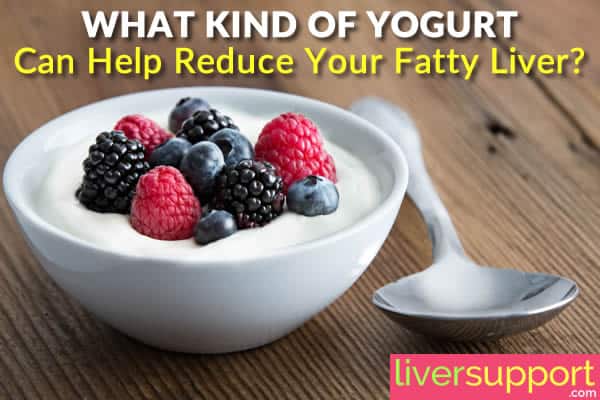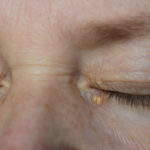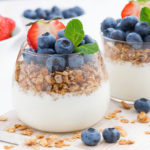
Previous
Is Bubbly Water Good for Your Liver?

Next
The Link Between Psoriasis and Fatty Liver
What Kind of Yogurt Can Help Reduce Your Fatty Liver?
Many healthy food choices seem to include yogurt. Research even indicates that yogurt can benefit those with a fatty liver. However, all yogurts are not created equally – and the healthful attributes of yogurt are not universal.
Fatty Liver
An estimated 20 to 30% of American adults have fatty liver disease, an excess of fat accumulation in your liver.
Risk factors for fatty liver include:
- being overweight
- having diabetes
- insulin resistance
- high cholesterol
In addition, regular, excessive consumption of alcohol, toxins and certain drugs can cause a fatty liver, too. There is no pharmaceutical solution for reversing fatty liver disease. Instead, physicians counsel their patients with fatty liver disease to minimize their risk factors.
Common approaches include:
- Improving diet
- Losing weight
- Increasing physical activity
The best diet for a fatty liver focuses on nutrient dense foods such as fruits, vegetables, lean protein, whole grains and healthy fats (often found in nuts, fish, avocado, coconut, seeds and olive oil).
Dairy
When it comes to improving diet, low-fat and non-fat dairy products can be a great source of protein, valuable for losing excess weight if:
- It is part of a well-balanced, calorie-controlled diet.
- The person is able to digest dairy products without problem.
- The dairy is not inundated with chemicals and hormones.
Dairy products are high in protein and nutritionally loaded, but only low-fat or non-fat versions are advised. This is because full-fat dairy products increase known risks (weight gain and high cholesterol) for a fatty liver. Unfortunately, most of the fats found in full-fat dairy products are saturated fats. Although debate has been brewing lately about the healthful status of saturated fats, there is significant proof that saturated fats encourage inflammation.
It is important to note that the origin of dairy products is cow’s milk – a substance that has also faced great controversy. Published research has shown a possible link between dairy and inflammation and dairy and hormone sensitive cancers. However, consuming organic (no chemicals or hormones) dairy products appears to mitigate this risk.
Research on Yogurt and Fatty Liver
According to a clinical review in the February 2013 edition of Hepatitis Monthly, microorganisms in the intestinal tract play a significant role in liver cell function. There is a growing body of evidence indicating that non-alcoholic fatty liver disease (NAFLD) is correlated with changes in the intestinal microflora. Yogurt may possess the means to improve gut microflora because it is produced by fermenting milk with bacteria. Different varieties of bacteria are used to provide varying consistency and tastes, with an average of two to six different strains of bacteria present in yogurt. These strains are known as probiotics, and can improve the intestinal microflora.
As published in a December 2014 edition of the Journal of Dairy Science, researchers concluded that consuming yogurt with probiotics helps reduce fatty liver disease risk factors. The study’s participants had NAFLD and were divided into two groups; one group consumed 300 g/day of probiotic yogurt containing Lactobacillus acidophilus and Bifidobacteriumlactis. The other group consumed 300 g/day of conventional yogurt. They found that those in the group consuming probiotic yogurt had a significant reduction in weight, body mass index, and serum levels of fasting insulin as compared with that in the control group – all known risks for NAFLD. Thus, yogurt that contains probiotics may help manage fatty liver disease risks.
More About Yogurt
Yogurt is made by fermenting milk with a live bacteria culture. The culture ferments the lactose (the natural sugar found in milk) to produce lactic acid, which gives yogurt its distinctive flavor. Yogurt typically contains calcium, Vitamin B6 and B12, riboflavin, potassium, magnesium and lots of protein.
Regular yogurt contains about 12 grams of protein per 7 ounce serving, while Greek yogurt contains about 22 grams of protein per 7 ounce serving. Due to its high protein content, Greek yogurt has been shown to influence appetite control and delay feelings of hunger – two valuable properties that reduce fatty liver risk.
Of course, not all yogurts are healthy. If considering yogurt to help reduce fatty liver risk, choose the following four options for best results:
- Non-fat – No need to consume fat when trying to reduce fatty liver, especially because non-fat yogurt is readily available.
- Live Cultures – Make sure your yogurt contains live and active cultures; it should be indicated on the label.
- Greek – Because of its much higher protein content, stick with the Greek variety.
- No Added Sugar – Many popular yogurts come in flavors that have high amounts of added sugar, the exact ingredient that can create a fatty liver. While some natural sugar will be present, look for one with less than 15 grams of sugar per serving. The best bet is to choose plain, unsweetened yogurt – and add fresh fruit for flavor instead.
Yogurt Caution
Non-fat, organic, Greek, plain yogurt may seem like a no-brainer as your culinary staple, but yogurt is not for everyone. Some need to be cautious with yogurt because it may cause adverse effects – especially in those with lactose intolerance or a milk allergy.
- Lactose Intolerance – This is when someone lacks lactase, the enzyme that breaks down lactose. Those with lactose intolerance may be able to tolerate yogurt because lactose is broken down during the fermentation process. However, this will be different for each individual.
- Milk Allergy – Milk contains casein and whey, two proteins that can be an allergen for some people. For those with a milk allergy, yogurt can trigger an allergic reaction. These individuals are advised to avoid consuming yogurt.
In the end, regular consumption of yogurt can help reduce the risk of fatty liver disease. However, be smart if you have a lactose intolerance or milk allergy. In addition, choose the right type of yogurt (organic, Greek, non-fat, plain) for optimal liver health.
Editor’s Note: If you’re concerned about your fatty liver, you should learn more about Clinical LiverSupport. It provides comprehensive liver health and function by reducing fat accumulation in your liver, and by reducing inflammation in your liver and throughout your body by interfering with various stages of the inflammation process.
https://authoritynutrition.com/7-benefits-of-yogurt/, 7 Impressive Health Benefits of Yogurt, Brianna Elliott, RD, Retrieved July 30, 2017, Authority Nutrition, 2017.
https://www.ncbi.nlm.nih.gov/pubmed/25306266, Effects of probiotic yogurt consumption on metabolic factors in individuals with nonalcoholic fatty liver disease, Nabavi S, et al, Retrieved July 23, 2017, Journal of Dairy Science, December 2014.
https://www.liverdoctor.com/dairy-products-good-or-bad/, Are Dairy Products Good or Bad for Your Health?, Retrieved July 23, 2017, Dr. Sandra Cabot, 2017.
http://www.liversupport.com/the-link-between-liver-disease-and-dairy-problems/#comments_area, The Link Between Liver Disease and Dairy Problems, Nicole Cutler, L.Ac., Retrieved July 23, 2017, Natural Wellness, 2017.
http://www.livestrong.com/article/26093-list-good-bacteria/, List of Foods Containing Good Bacteria, Clay McNight, Retrieved July 23, 2017, Leaf Group, Ltd, 2017.
http://www.livestrong.com/article/531364-side-effects-of-lactobacillus-gg-probiotics/, Yogurt & Fatty Liver Disease, Janet Renee, MS, RD, Retrieved July 23, 2017, Leaf Group, Ltd, 2017.
http://www.livestrong.com/article/543520-grapefruit-and-fatty-liver/, Dairy Foods & Fatty Liver, Kimberly Wonderly, Retrieved July 23, 2017, Leaf Group, Ltd, 2017.
http://www.medicalnewstoday.com/articles/295714.php, Yogurt: Types, health benefits, and risks, Megan Ware, RDN, LD, Retrieved July 30, 2017, Healthline Media, UK, Ltd, 2017.
http://www.yogurtinnutrition.com/yogurt-fatty-liver-disease/, Yogurt and Fatty Liver Disease, Retrieved July 23, 2017, Yogurt in Nutrition Initiative, 2017.










